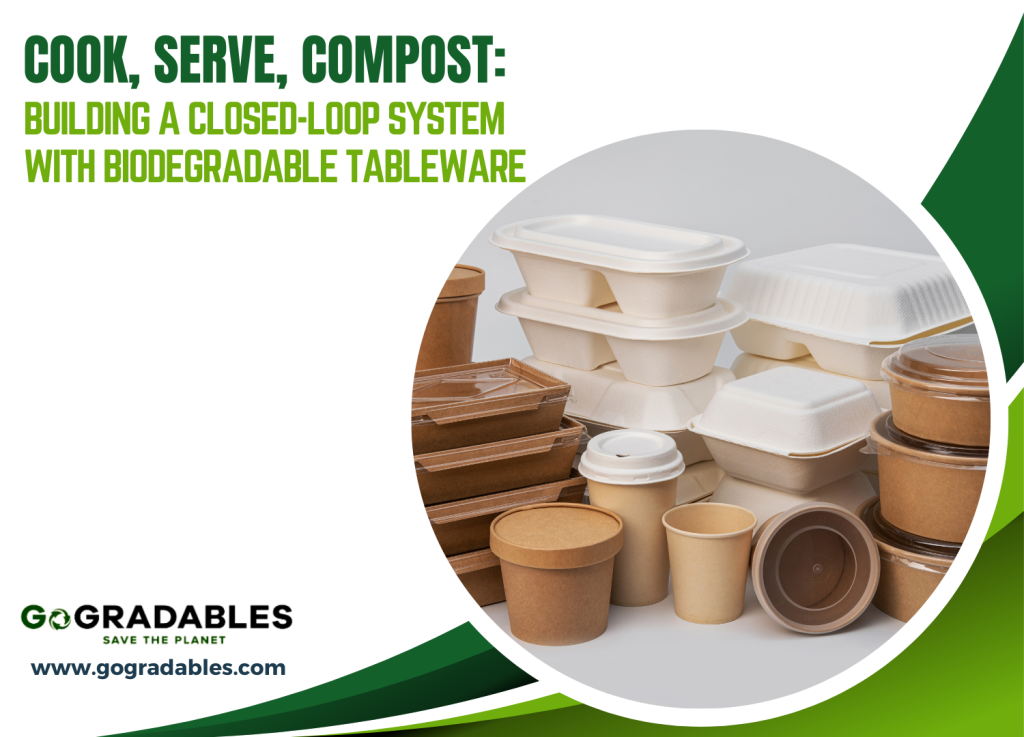Featured Post, Food Boxes, Restaurants
Cook, Serve, Compost: Building a Closed-Loop System with Biodegradable Tableware
Dealing with the challenges of plastic waste and environmental degradation, the concept of a circular economy has gained significant traction. At the heart of this paradigm shift lies the idea of reducing waste by designing products that can be reused, repaired, and ultimately returned to the earth in a sustainable manner. Biodegradable tableware is a shining example of how we can transform our dining habits into a closed-loop system that benefits both our environment and our future. In this blog, we’ll delve into the captivating concept of a circular economy with biodegradable tableware and explore how these products can be composted, completing the sustainability loop.
The Evolution of Tableware: A Circular Approach
Traditional tableware, often made from plastic or non-renewable materials, contributes to the growing issue of plastic pollution and waste accumulation in landfills. Biodegradable tableware, on the other hand, heralds a new era in sustainable dining. Crafted from materials like plant fibers, palm leaves, these products are designed to decompose naturally when discarded. This decomposition process not only minimizes the burden on landfills but also enriches the soil, contributing to a circular economy.
Closing the Loop: Composting Biodegradable Tableware
The beauty of biodegradable tableware lies in its potential to seamlessly integrate into the natural world. When these products reach the end of their life cycle, they can be composted, completing the loop and ensuring a return to the earth. Composting is the process by which organic materials break down into nutrient-rich soil, a practice that has been a cornerstone of sustainable agriculture for centuries.
Biodegradable tableware is a perfect candidate for composting due to its organic composition. When these products are discarded in a composting environment, microorganisms get to work, breaking down the materials into valuable nutrients that can nourish plants and support healthy soil ecosystems. This contrasts starkly with traditional plastics, which take centuries to break down and often release harmful chemicals into the environment during their decomposition process.
The Benefits of Composting Biodegradable Tableware
1. Reduced Waste: Composting biodegradable tableware significantly reduces the volume of waste that ends up in landfills, lessening the environmental burden on our planet.
2. Nutrient-Rich Soil: The compost produced from biodegradable tableware can enrich soil, enhancing its fertility and water-holding capacity, which is crucial for sustainable agriculture.
3. Reduced Carbon Footprint: Composting organic materials releases fewer greenhouse gases compared to the decomposition of plastics, contributing to climate change mitigation.
4. Educational Value: Embracing composting and the circular economy offers opportunities for education and engagement on environmental issues, fostering a sense of responsibility and stewardship.
How to Compost Biodegradable Tableware
Composting biodegradable tableware is straightforward, but it requires a few important considerations.
- Separate from Non-Organic Waste: Collect biodegradable tableware separately from non-organic waste. Establish a designated compost bin or heap.
- Balance Compost Ingredients: Mix biodegradable tableware with other compostable materials like food scraps, yard waste, and leaves to create a well-balanced compost pile.
- Aerate and Turn: Regularly turn and aerate the compost pile to encourage decomposition and prevent odors.
- Patience Pays: Composting takes time. Depending on the materials and conditions, biodegradable tableware may take a few weeks to several months to fully break down.
One brand that stands out in this endeavor is GoGradables. With a profound commitment to eco-conscious dining, GoGradables offers a diverse range of biodegradable tableware products, each crafted with materials like Bagasse, Kraft Paper Boxes, and Areca Palm Tableware. By investing in GoGradables’ offerings, we not only engage in the practice of circular economy but also support a brand that is dedicated to redefining the dining experience in harmony with nature. With GoGradables, the act of enjoying a meal transforms into a conscious choice that reverberates positively across the ecosystem.

